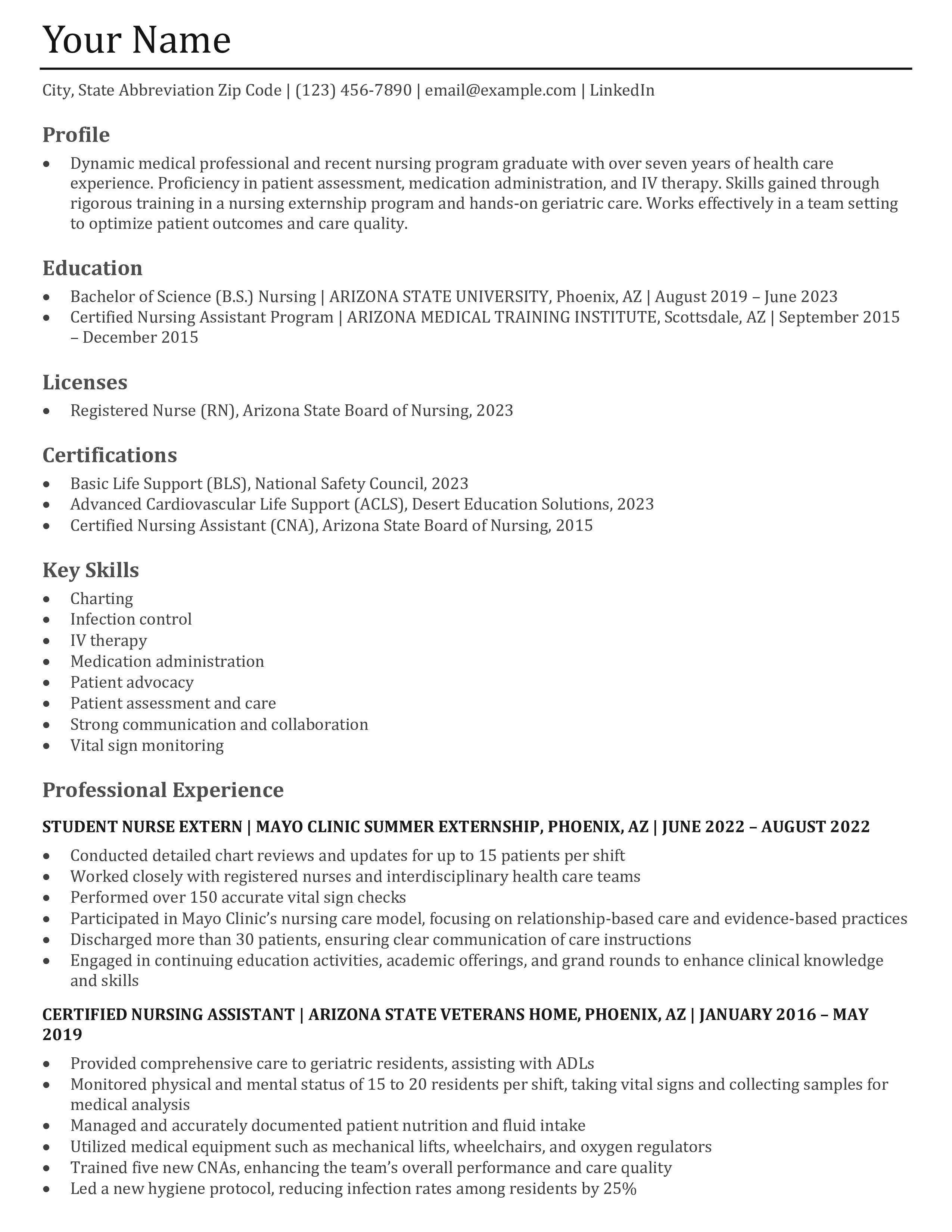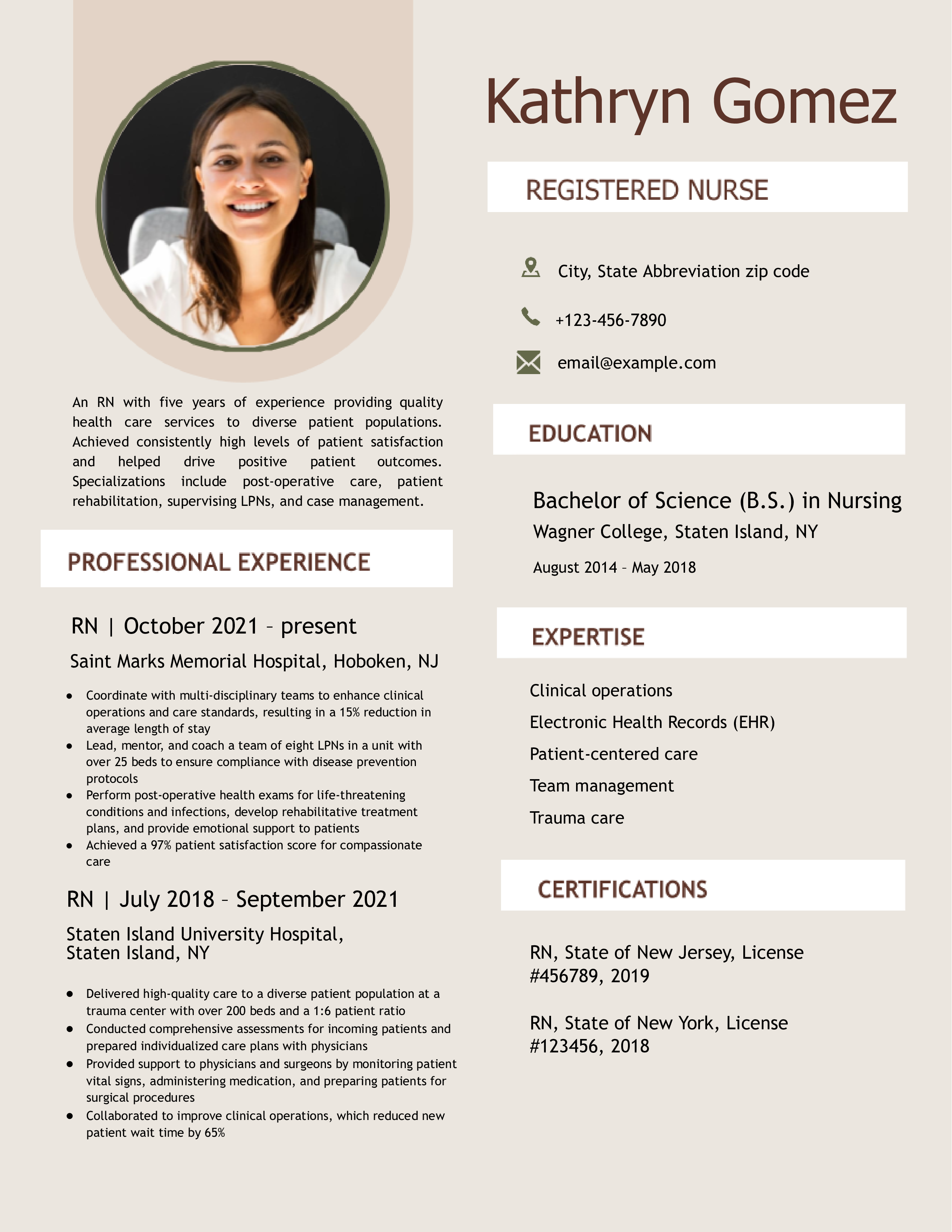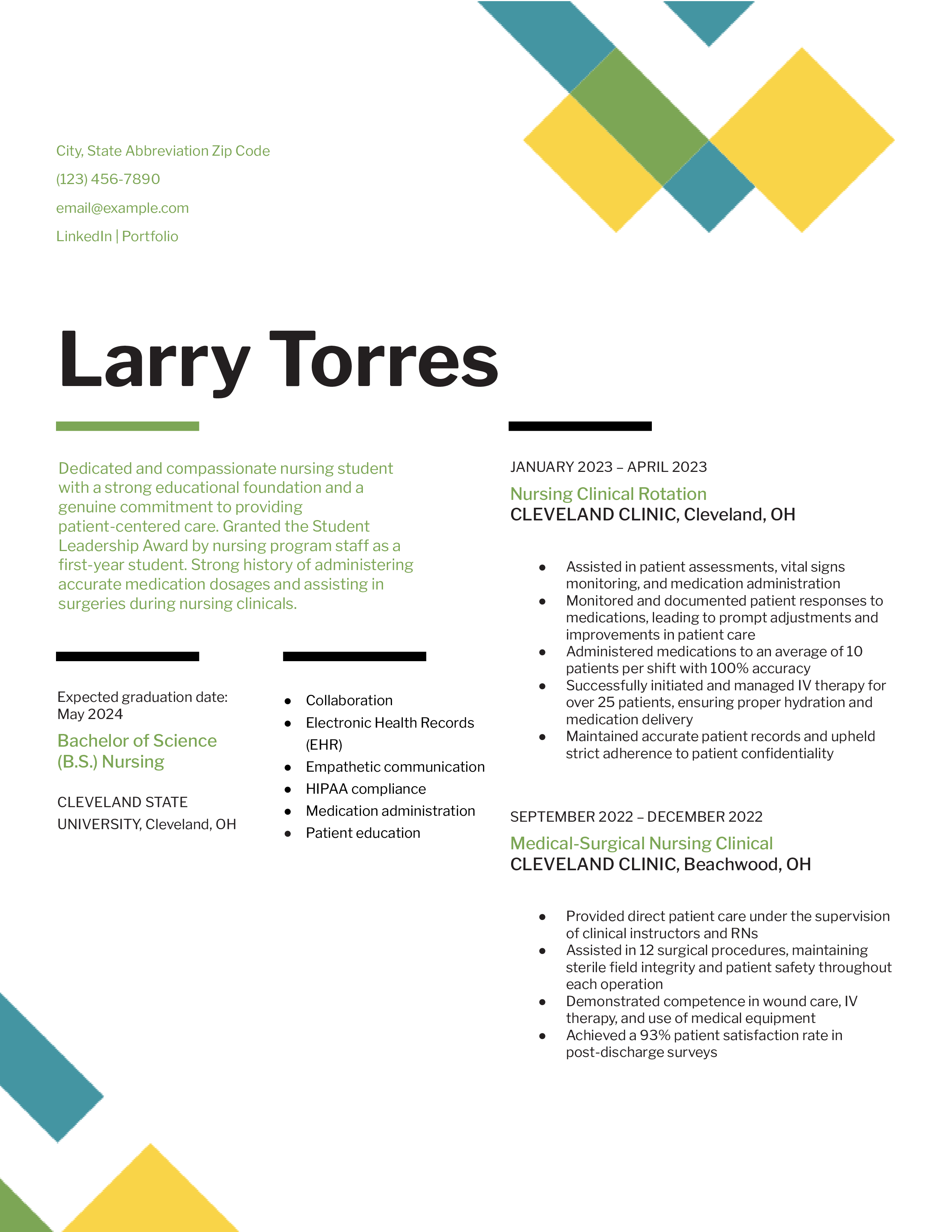Health care organizations depend on nurses to treat, educate, and support patients. Your registered nurse (RN) resume must show potential employers you have the skills and experience necessary to provide high-quality patient care. In this guide, we’ll equip you with the tools to write a resume highlighting the best aspects of your medical career and proving you can handle the demands of a nursing job.
Key takeaways
- Focus on specializations: Beyond your basic skills as an RN, emphasize your areas of expertise, such as pediatrics, oncology, or emergency care.
- Quantify patient care: Use numbers to describe aspects of your job and measure your contributions in previous nursing positions, such as how many patients you cared for each shift.
- Tailor your experience: To ensure your resume makes it through applicant tracking systems (ATS) and meets or exceeds employer expectations, incorporate relevant nursing experience and keywords throughout your resume.
Most Popular Registered Nurse Resumes
Entry-Level Registered Nurse Resume Example
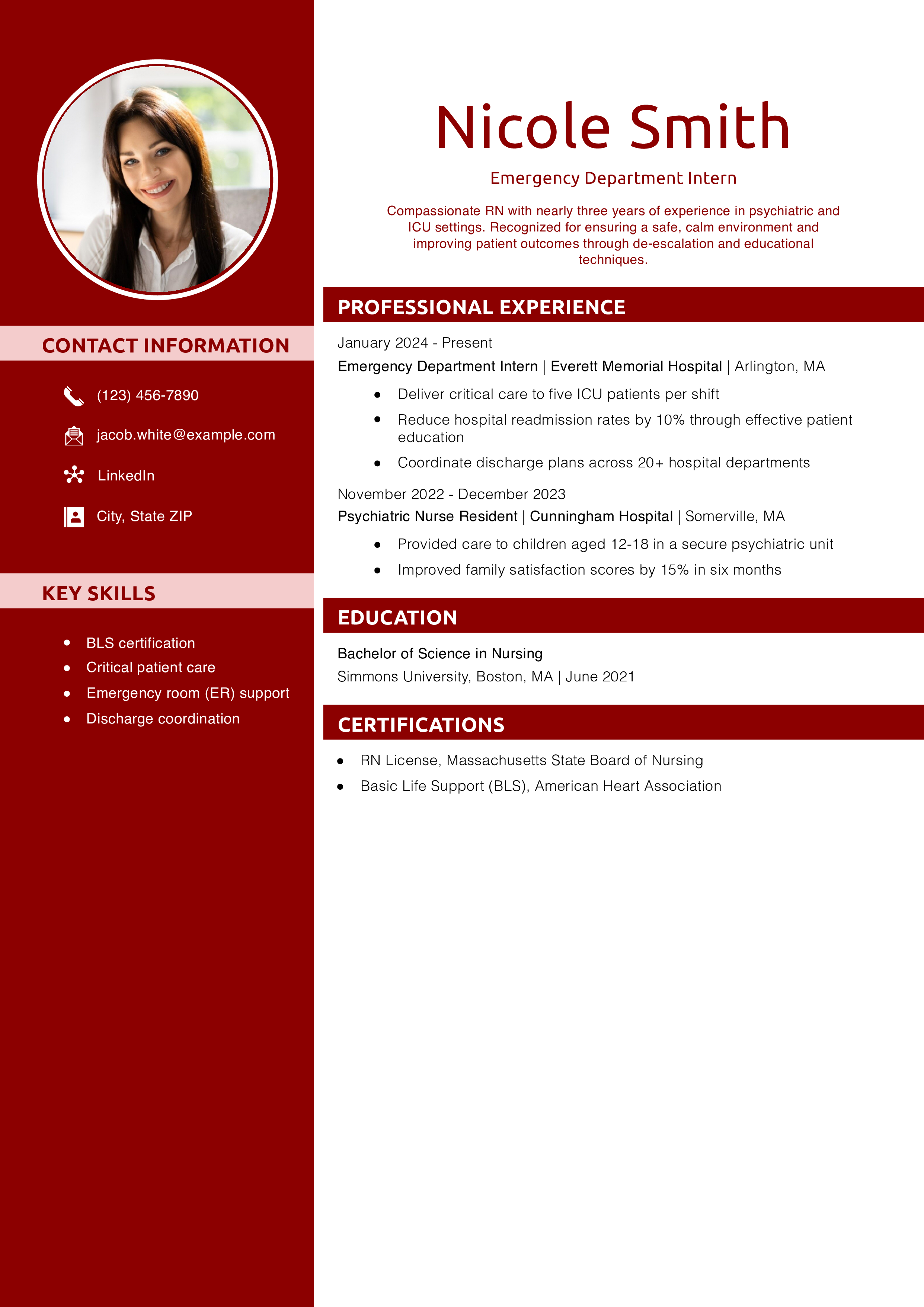
Why This Resume Works
This resume highlights valuable experience in a demanding internship and residency, alongside measurable outcomes like a 10% decrease in readmission rates. Learn how to tailor your resume for success here.
Experienced Registered Nurse Resume Example
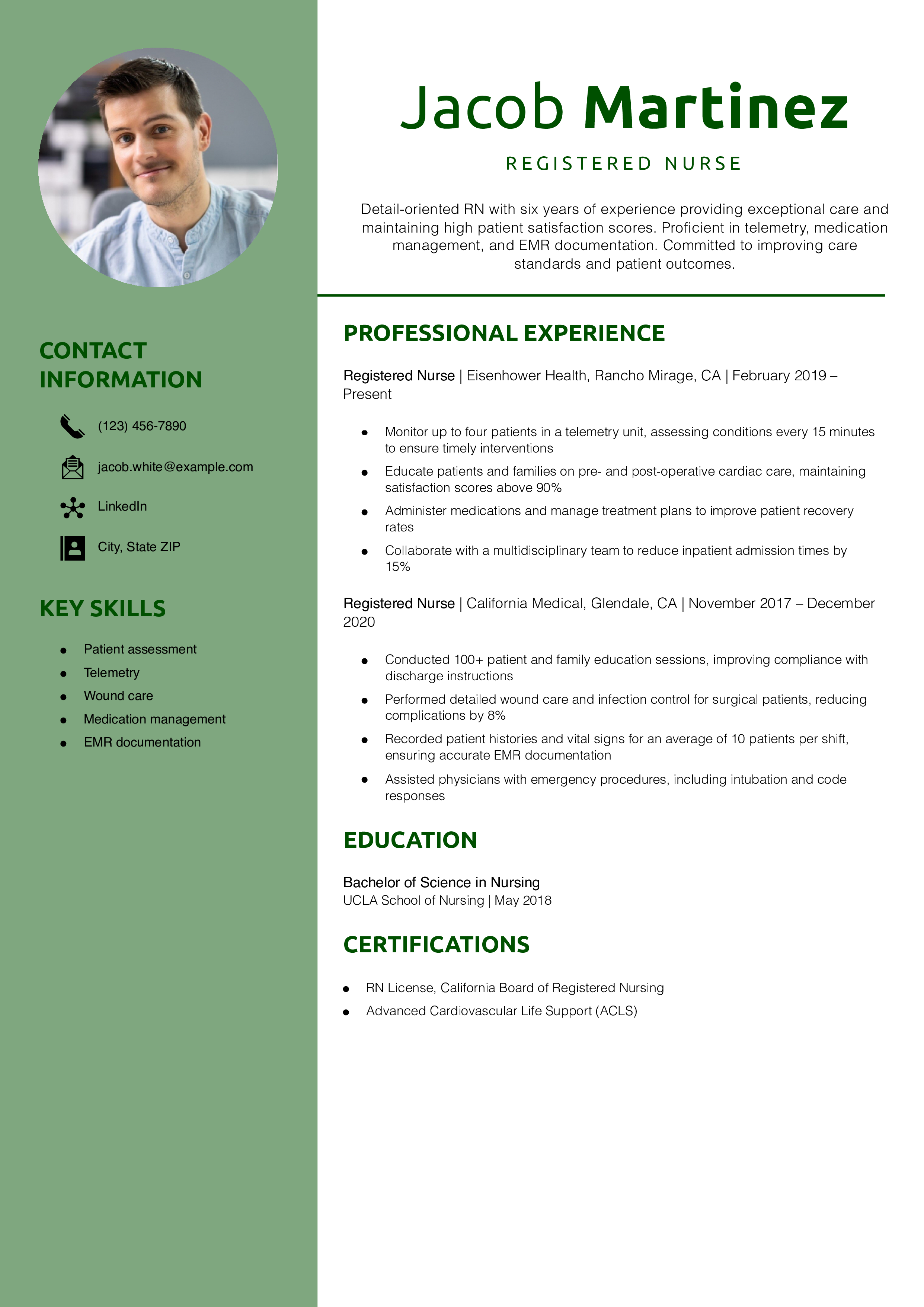
Why This Resume Works
This resume demonstrates expertise in both telemetry and wound care while showcasing measurable results, like reducing inpatient admission times by 15%. Learn how to craft an effective nursing resume here.
ICU Registered Nurse Resume Example
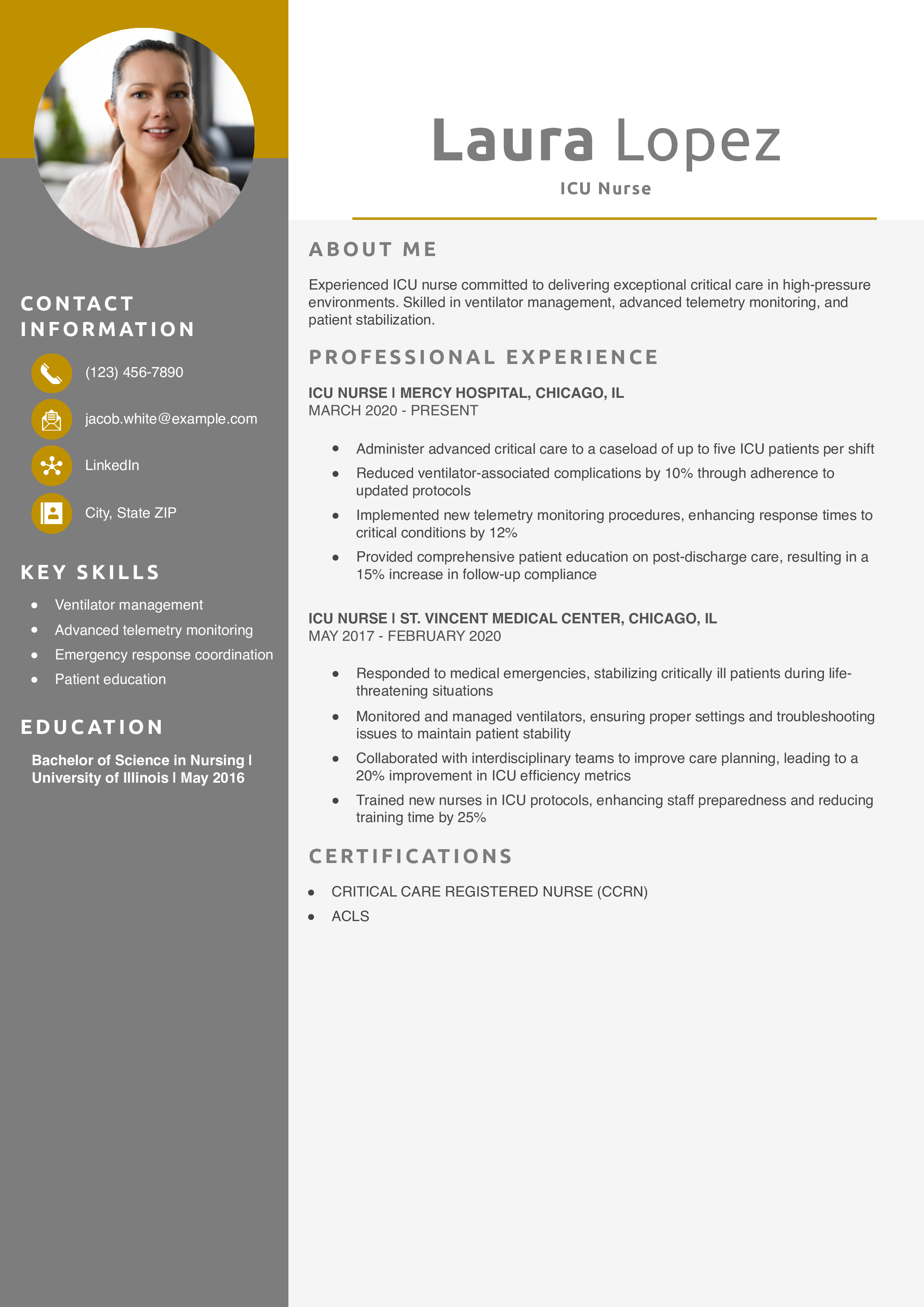
Why This Resume Works
This resume highlights critical care expertise with quantifiable achievements, like reducing ventilator-associated complications by 10%. Learn how to make your resume stand out here.
Medical-Surgical Registered Nurse Resume Example
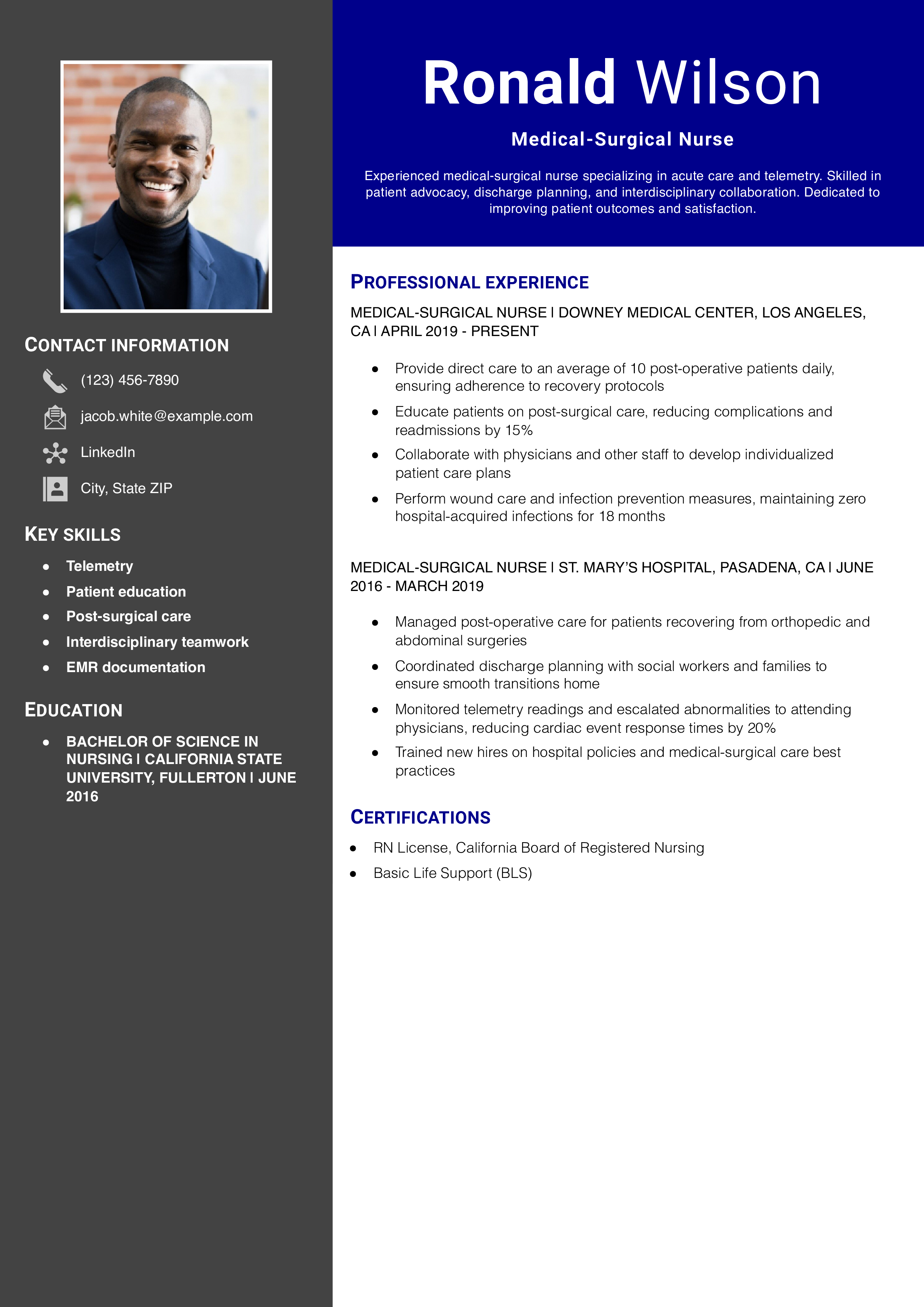
Why This Resume Works
This resume emphasizes expertise in post-surgical care and teamwork, highlighting measurable outcomes like a 15% reduction in complications. Learn more about creating a standout resume here.
Critical Care Registered Nurse Resume Example
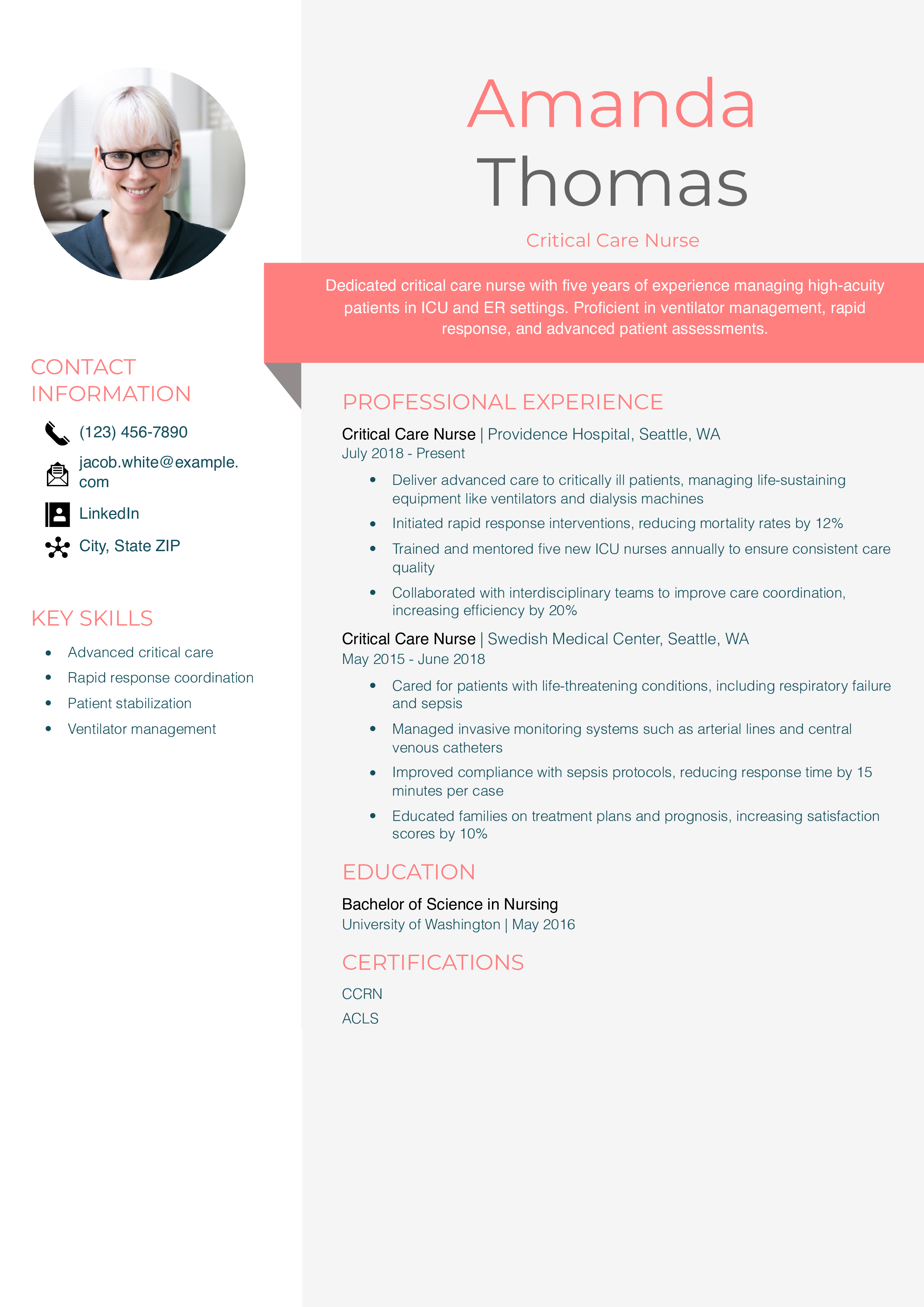
Why This Resume Works
This resume showcases critical care expertise, including training and rapid response interventions, with quantifiable improvements in mortality and satisfaction rates. Explore more tips for writing a strong nursing resume here.
Pediatric Registered Nurse Resume Example
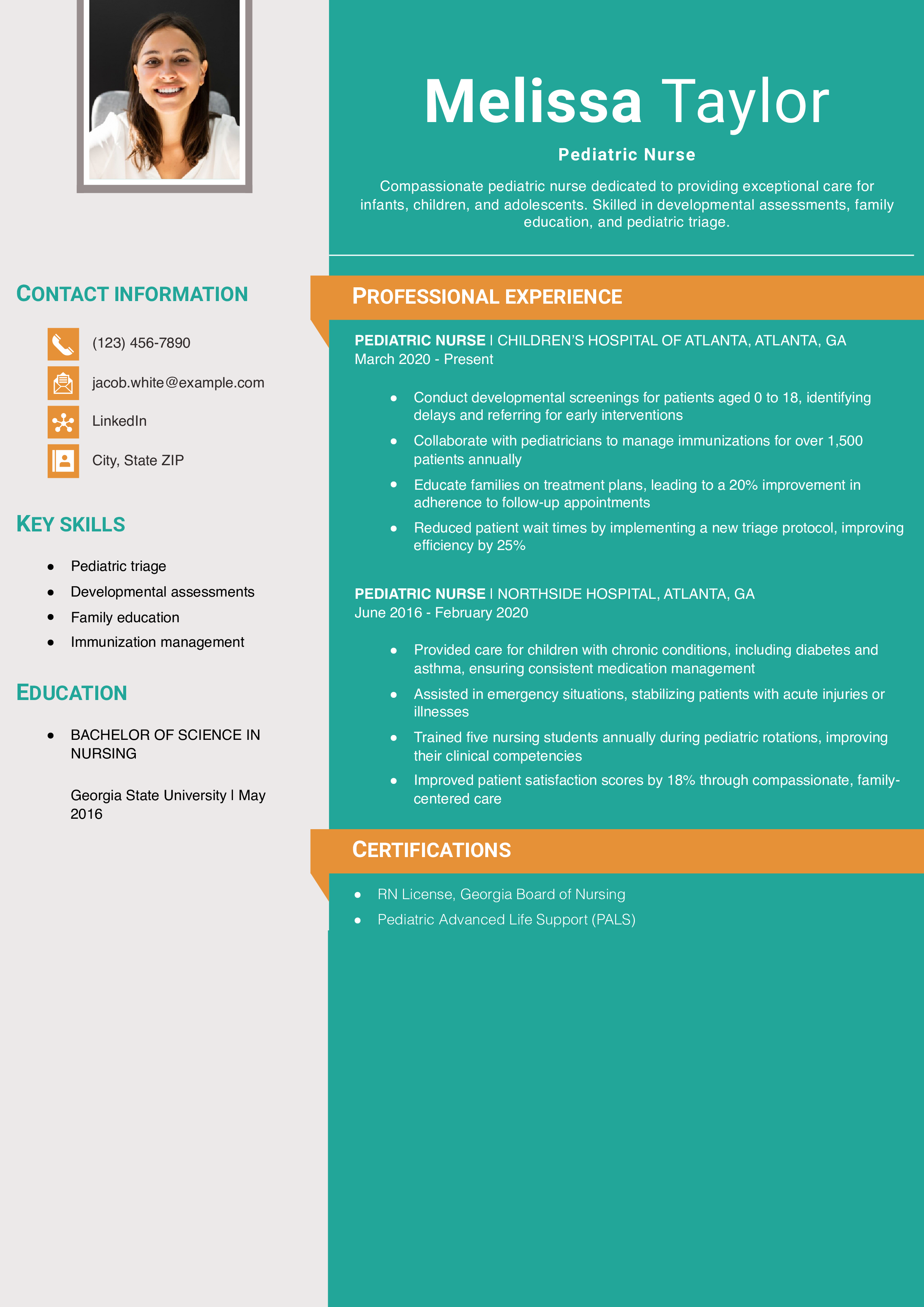
Why This Resume Works
This resume highlights specialized pediatric skills and emphasizes outcomes like improved adherence and patient satisfaction. Learn how to tailor your resume to highlight specific expertise here.
Senior Registered Nurse Case Manager Resume Example
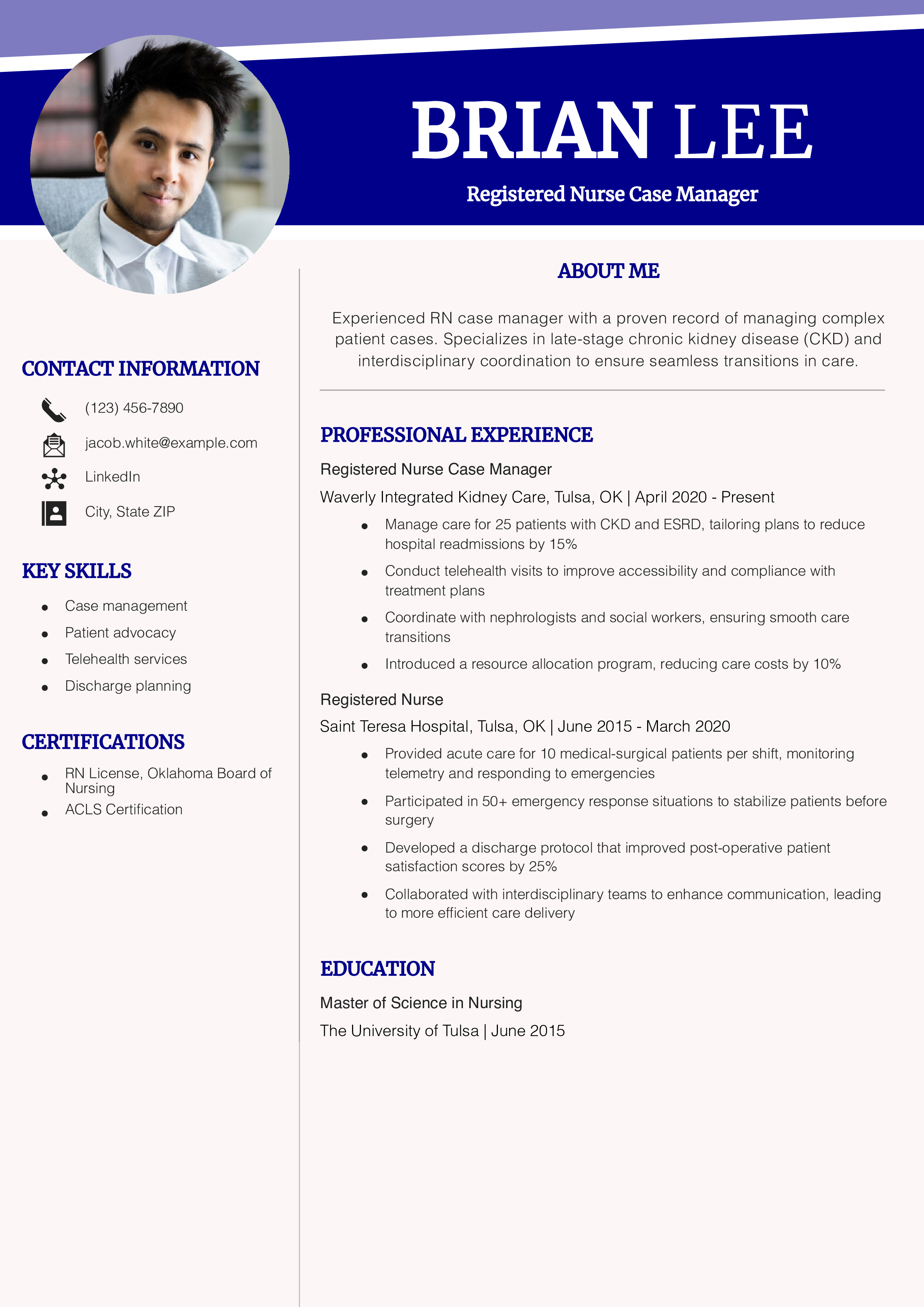
Why This Resume Works
This resume showcases both leadership and hands-on patient care skills, supported by quantifiable improvements in patient outcomes and cost reductions. Learn how to update your resume effectively here.
Travel Nurse Resume Example
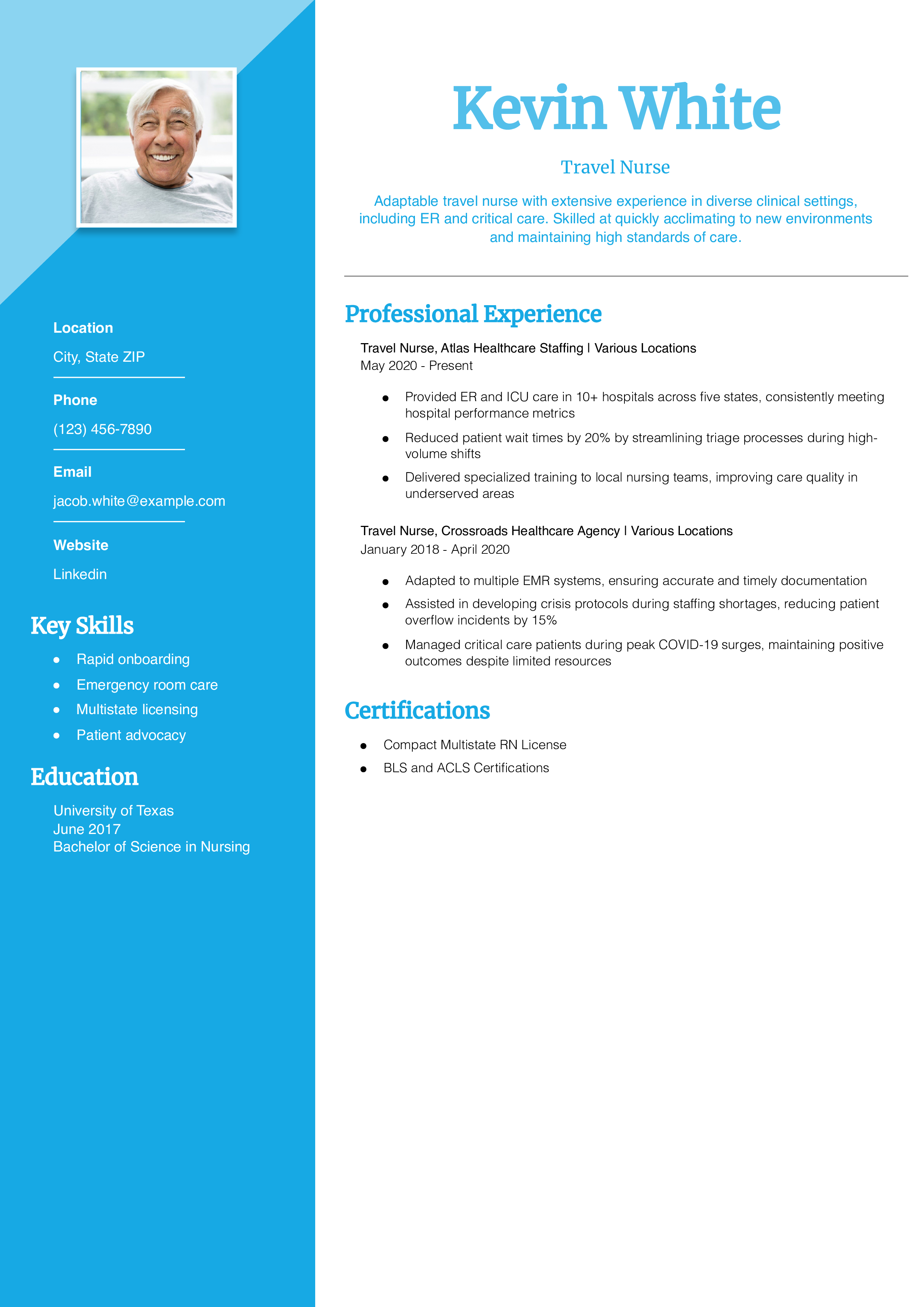
Why This Resume Works
This resume emphasizes adaptability and highlights achievements across multiple facilities, such as reducing patient wait times. Learn how to showcase flexibility and results here.
Neonatal Nurse Resume Example

Why This Resume Works
This resume focuses on neonatal expertise and quantifiable achievements, like reducing complications and increasing parent satisfaction. Learn how to highlight specialized nursing skills here.
School Nurse Resume Example
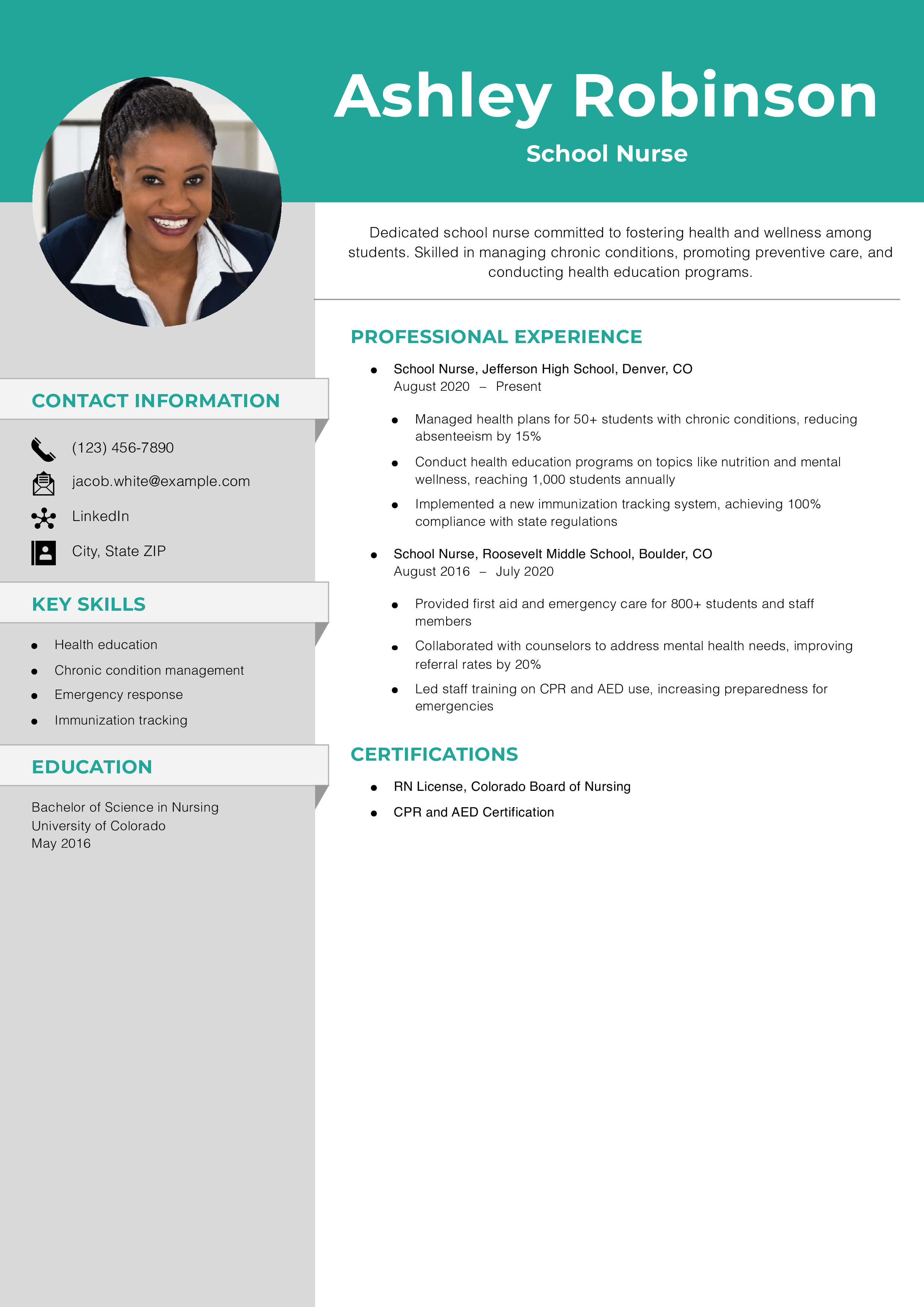
Why This Resume Works
This resume demonstrates leadership in school health programs and quantifies the impact of initiatives like reduced absenteeism and improved compliance. Learn how to write resumes tailored for specialized roles here.
Telemetry Nurse Resume Example
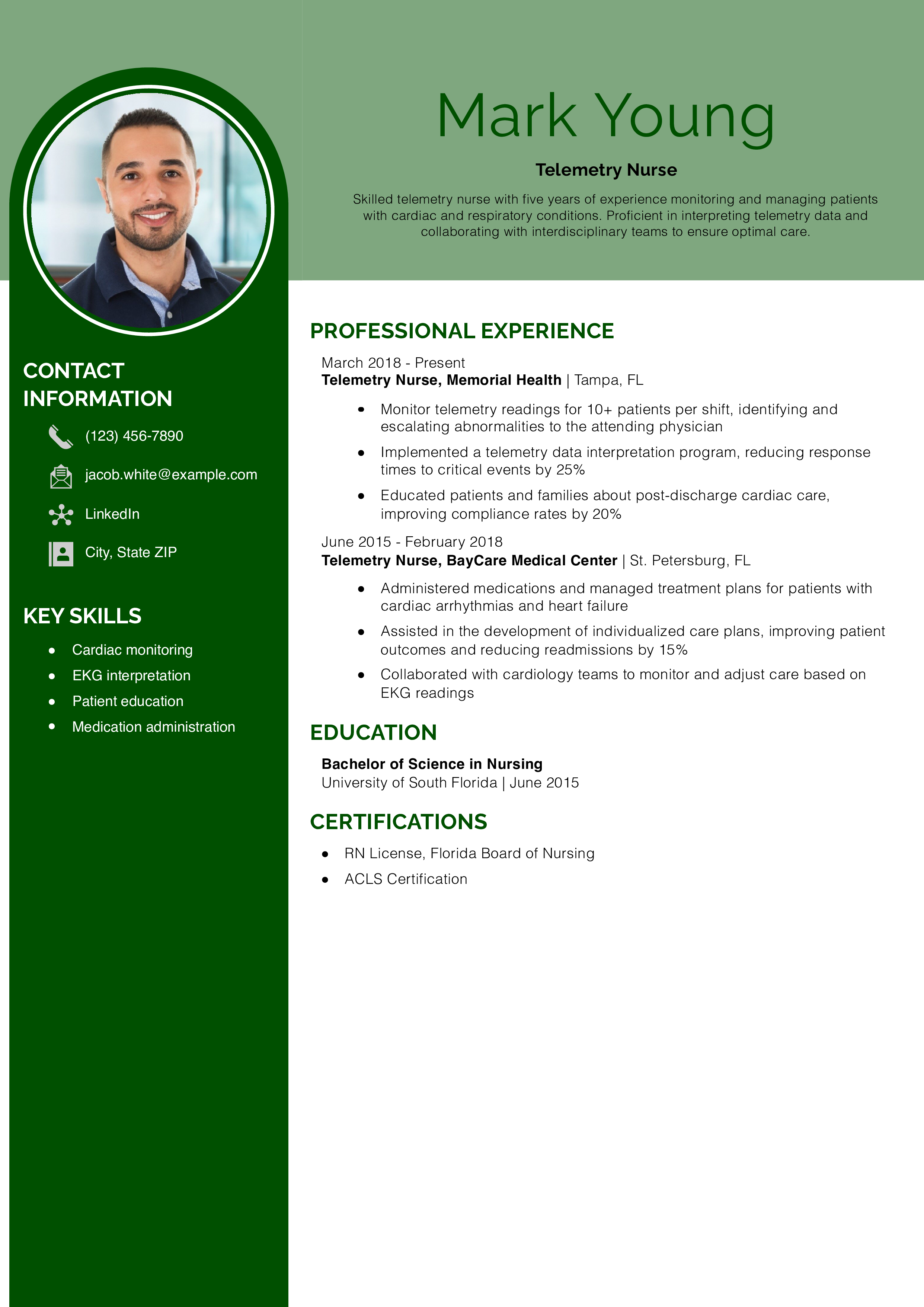
Why This Resume Works
This resume demonstrates expertise in telemetry care and provides measurable results, such as reducing response times and improving patient compliance. Discover more tips for crafting strong resumes here.
Emergency Room Nurse Resume Example
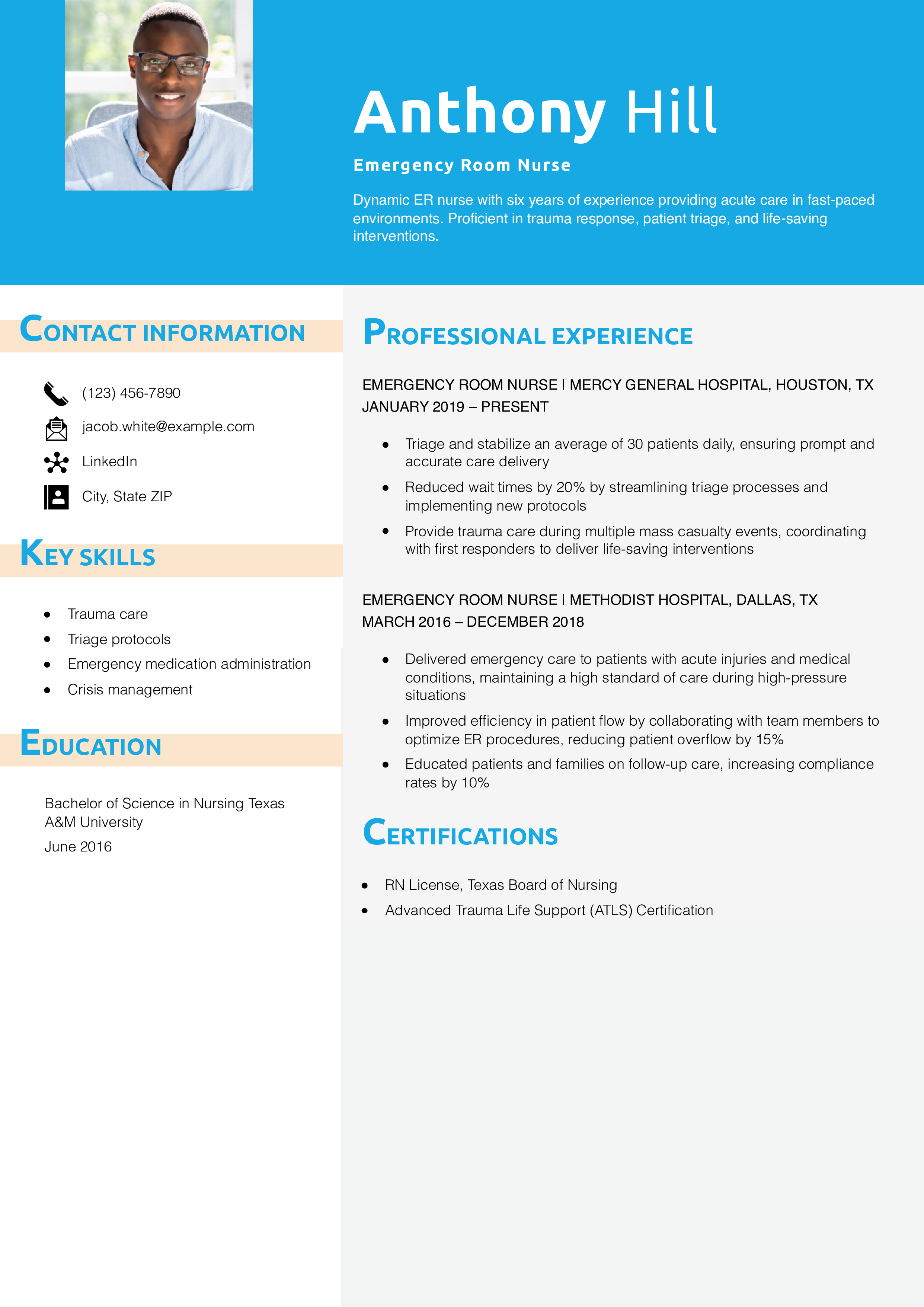
Why This Resume Works
This resume highlights a strong ability to thrive in high-pressure environments and includes measurable improvements, such as reducing wait times by 20%. Learn how to emphasize critical care expertise here.
Hospice Nurse Resume Example
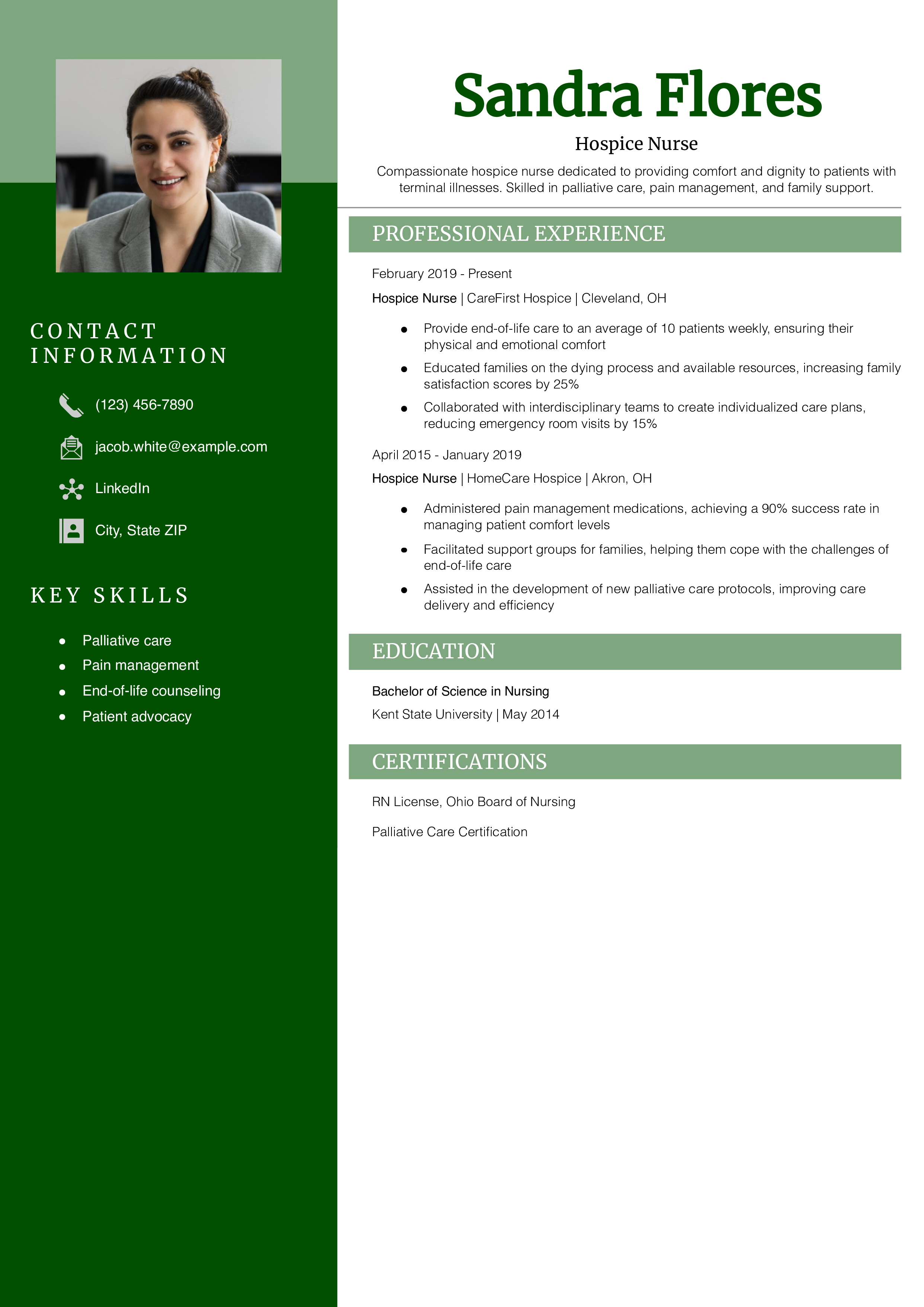
Why This Resume Works
This resume emphasizes the nurse’s ability to provide compassionate care while showcasing measurable outcomes, like improving family satisfaction scores. Learn how to tailor your hospice nurse resume here.
Nurse Educator Resume Example
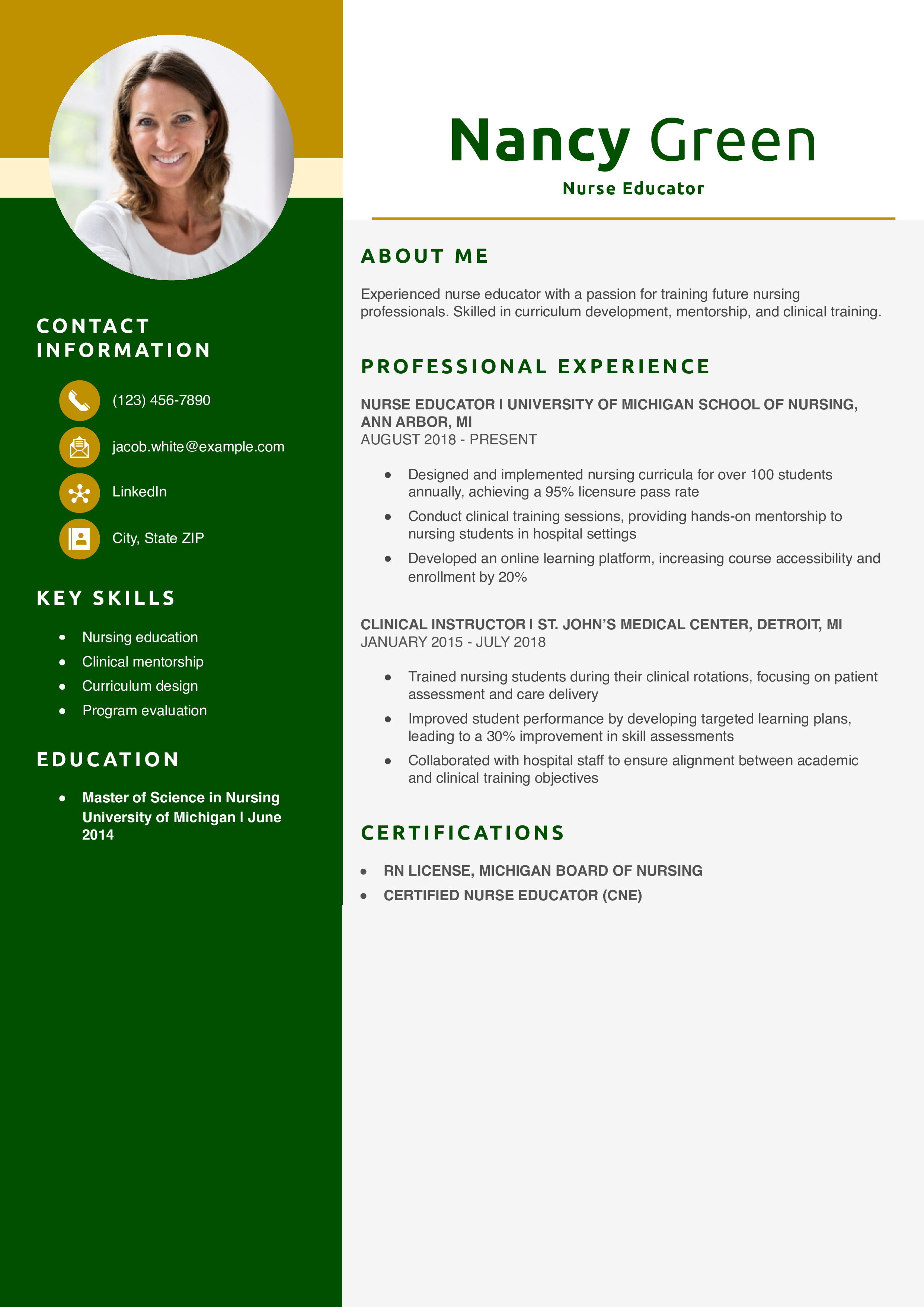
Why This Resume Works
This resume showcases the ability to design impactful nursing education programs and provides quantifiable outcomes, like a 95% licensure pass rate. Learn how to highlight teaching skills here.
Cardiac Nurse Resume Example
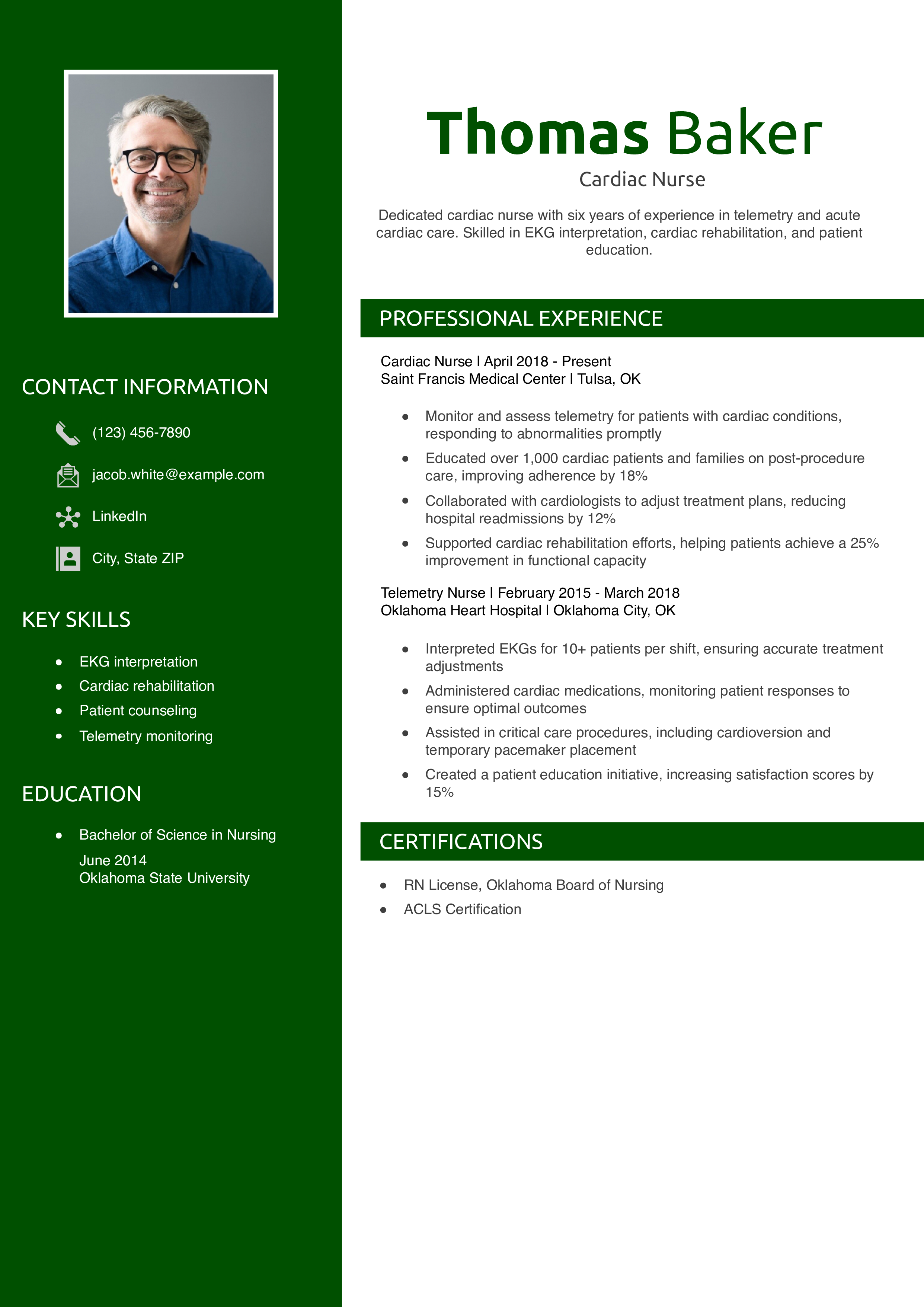
Why This Resume Works
This resume highlights specialized cardiac care expertise, supported by quantifiable achievements like reduced readmissions and improved patient satisfaction. Learn how to showcase cardiac nursing skills here.
Dialysis Nurse Resume Example
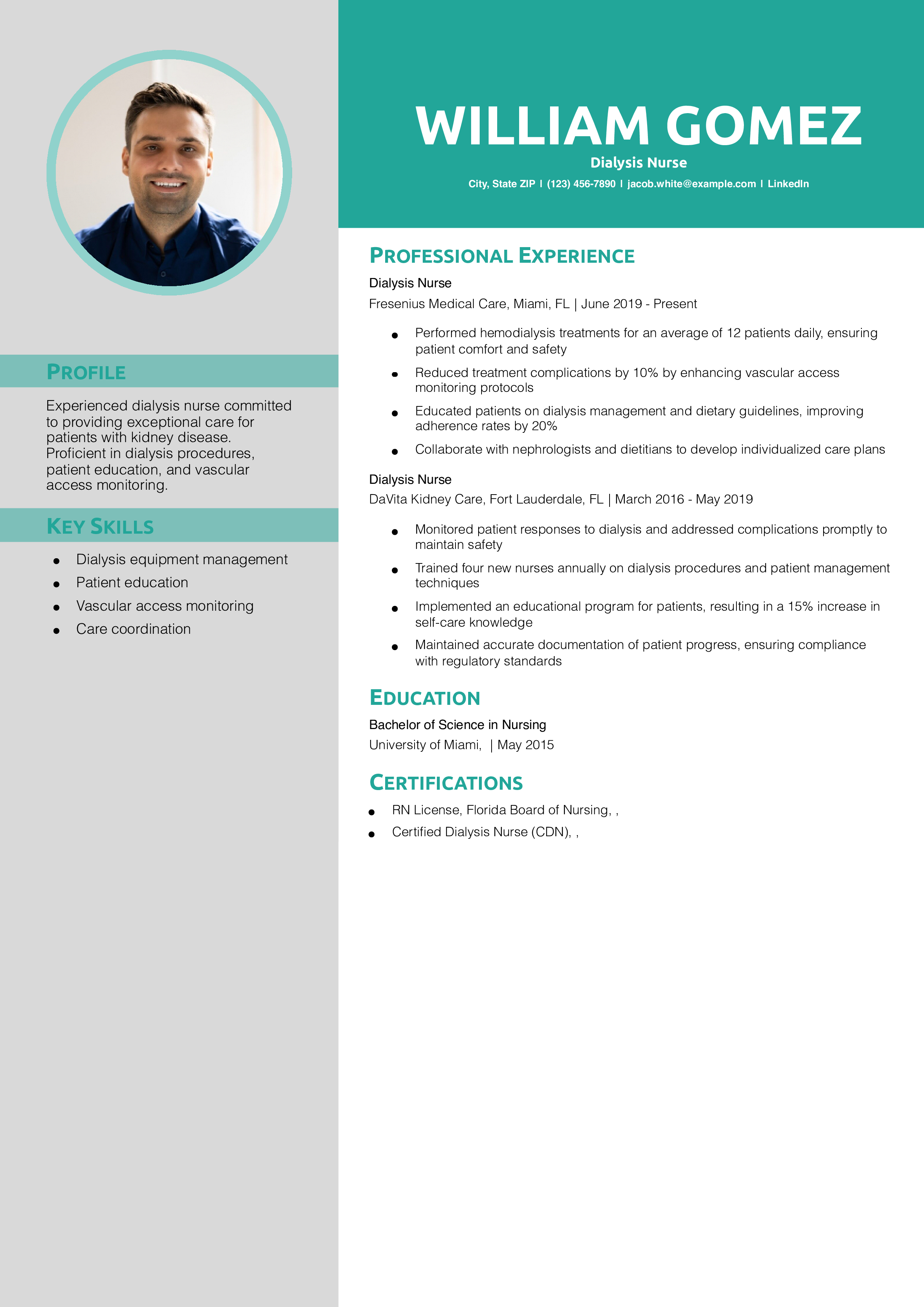
Why This Resume Works
This resume emphasizes dialysis-specific skills and measurable outcomes, such as improving adherence rates by 20%. Learn how to structure your resume for specialized roles here.
Oncology Nurse Resume Example
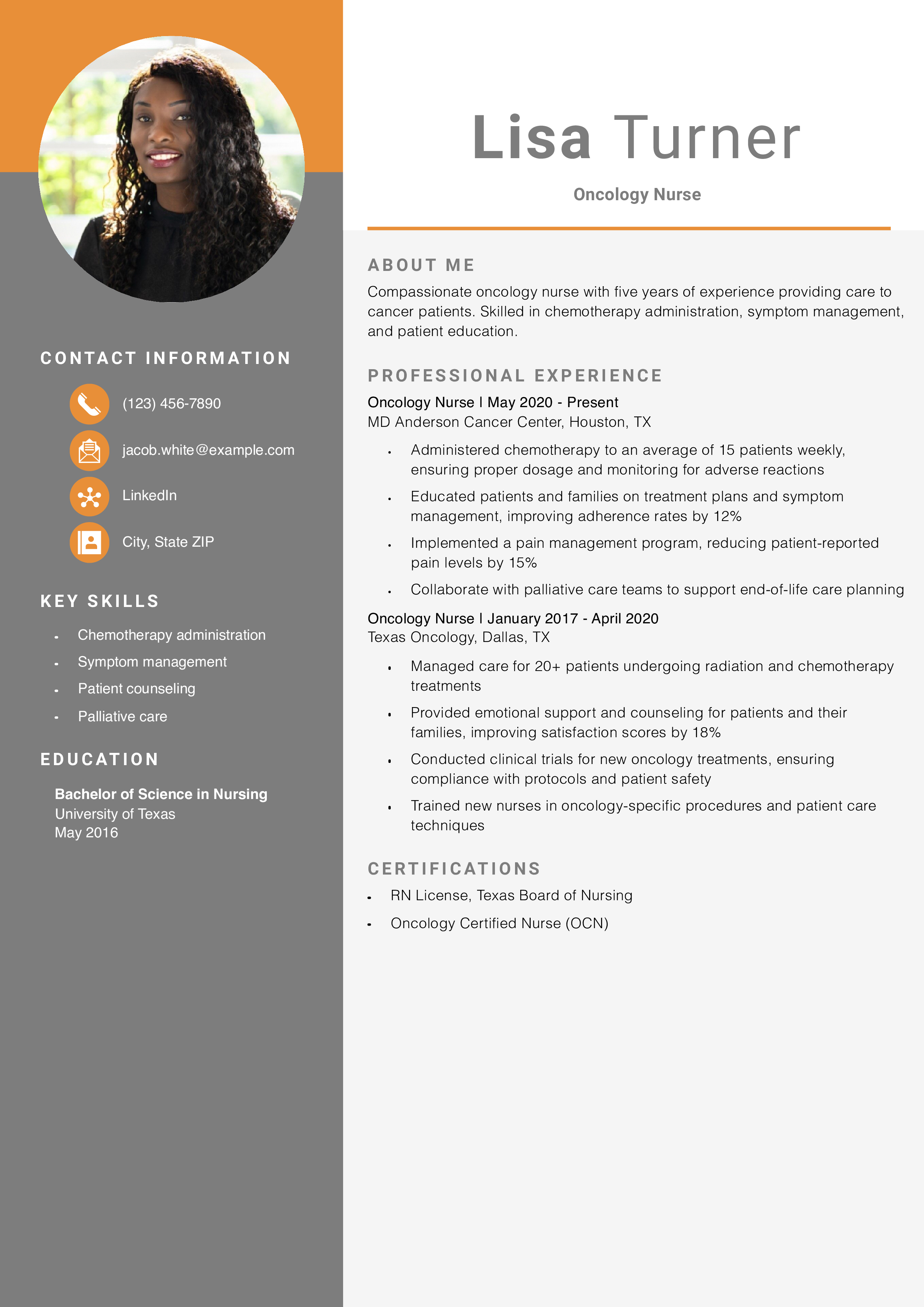
Why This Resume Works
This resume highlights oncology-specific expertise and quantifiable outcomes, such as improving adherence and reducing pain levels. Learn how to tailor your oncology nurse resume here.
Nurse Informaticist Resume Example
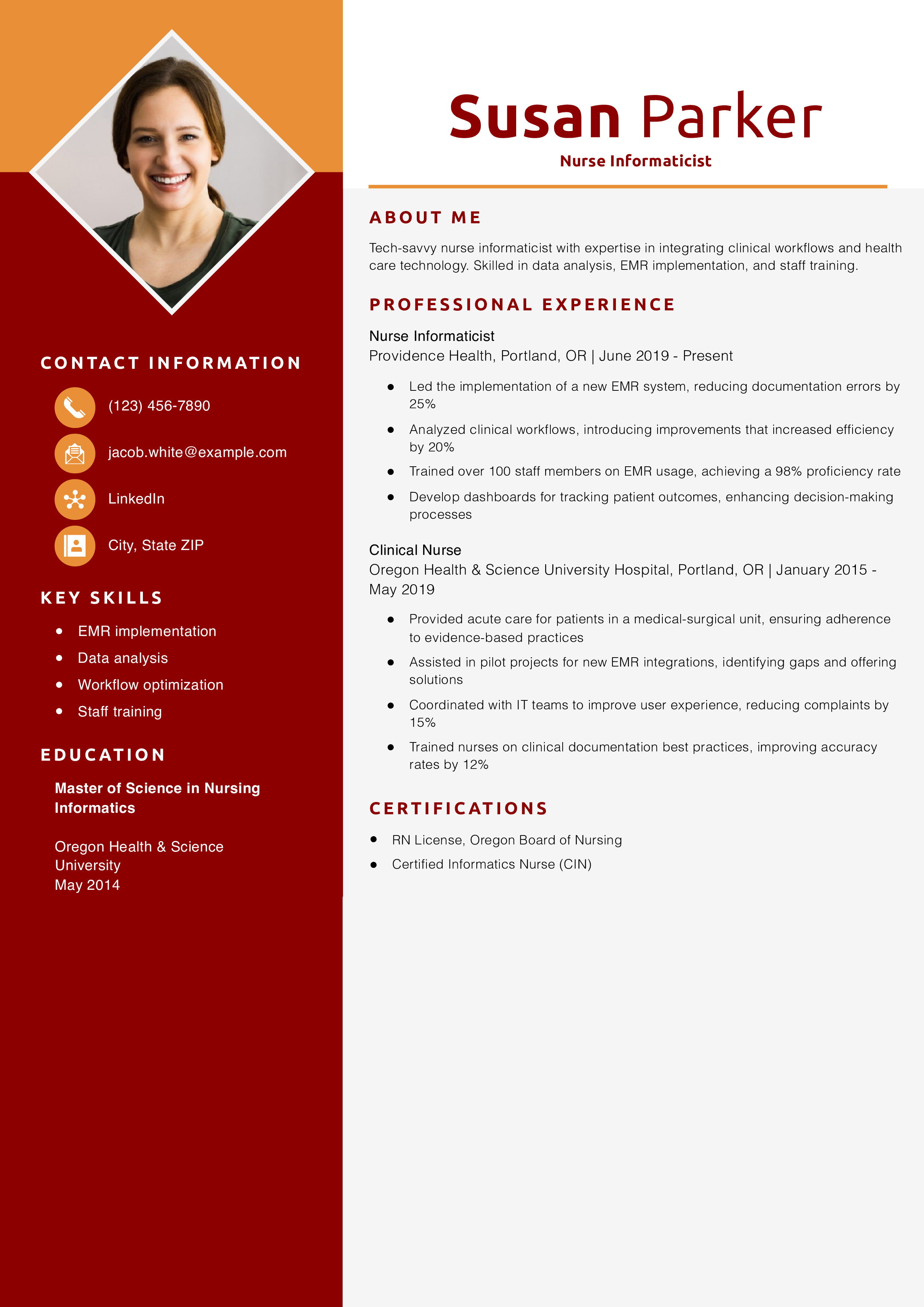
Why This Resume Works
This resume demonstrates a blend of clinical and technological expertise, with measurable results such as reduced documentation errors. Learn how to highlight technical nursing skills here.
Geriatric Nurse Resume Example
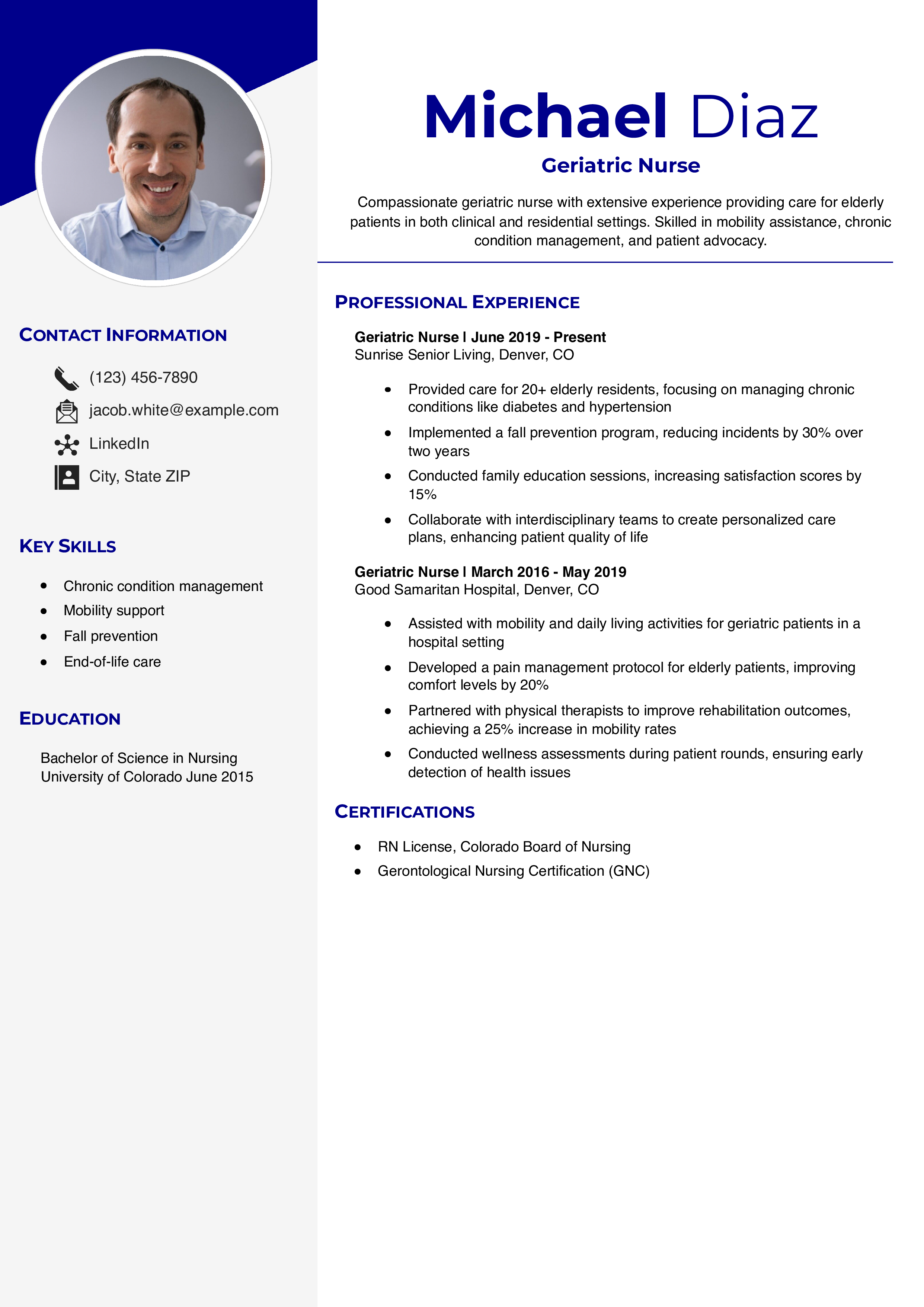
Why This Resume Works
This resume emphasizes expertise in geriatric care and measurable outcomes, such as a 30% reduction in fall incidents. Learn how to highlight specialized nursing skills here.
Occupational Health Nurse Resume Example
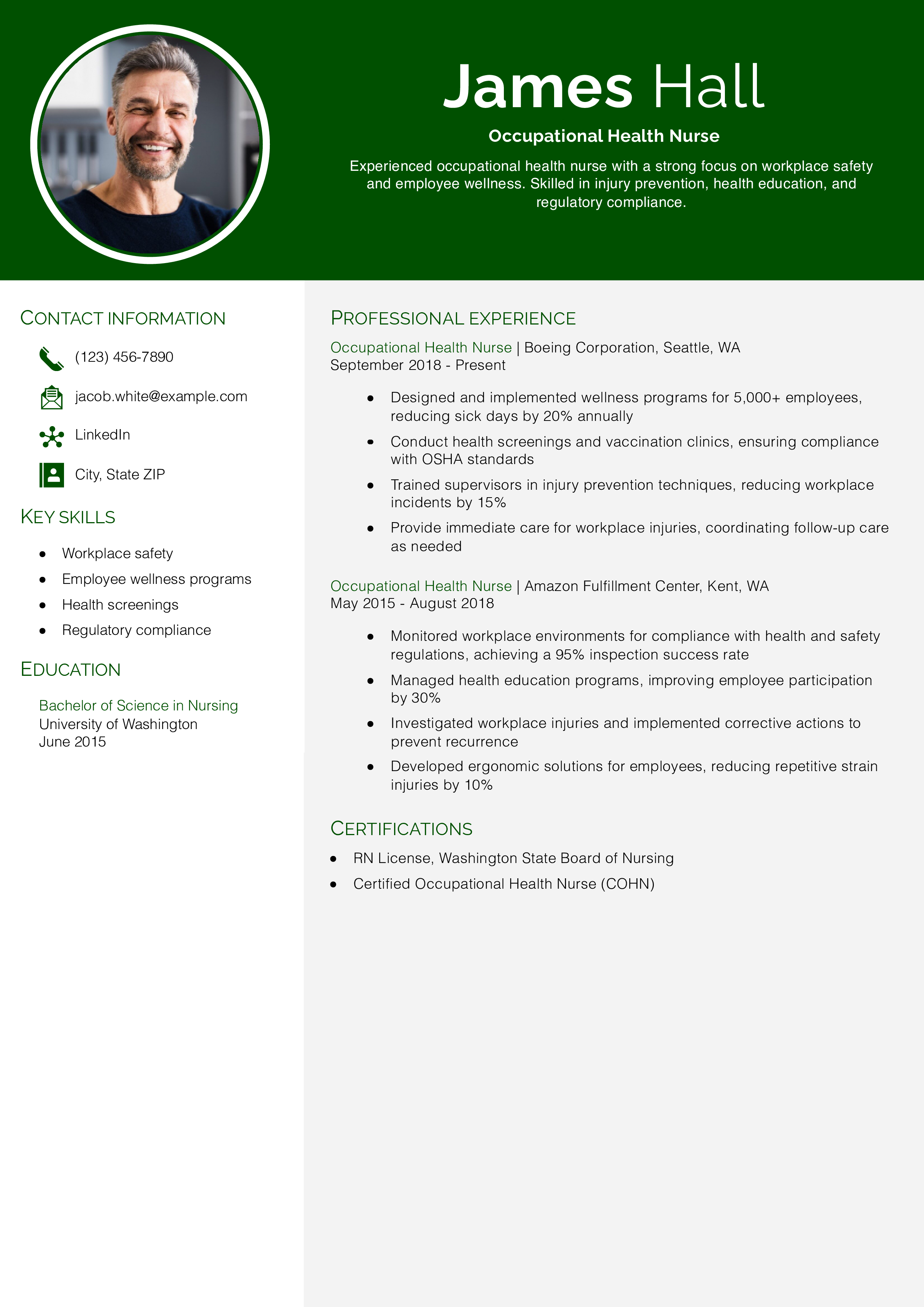
Why This Resume Works
This resume highlights achievements in workplace health and safety, such as reducing sick days by 20%. Learn how to make your occupational health nursing resume stand out here.
Registered Nurse Text-Only Resume Templates and Examples
How To Write a Registered Nurse Resume Example
To make the best impression on hiring managers, use a professional resume template. This gives you a strong foundation for your document and helps you organize your work history. Your RN resume should include these sections:
- Contact information
- Profile
- Key skills
- Professional experience
- Education and certifications
1. Share your contact information
Provide your most up-to-date contact information to let potential employers know who you are and how to reach you for an interview. At the top of your resume, include your full name, phone number, email address, location, and a link to your online professional profile, such as LinkedIn.
Example
Your Name
(123) 456-7890
[email protected]
City, State Abbreviation Zip Code
LinkedIn
2. Summarize your registered nurse qualifications in a dynamic profile
Using a few powerful sentences, give a brief overview of who you are as a nurse and what distinguishes you from your peers. This should include your job title, years in the medical field, and any specializations. Describe how you approach patient care, including a credential or achievement you’re proud of.
If you’re applying for multiple jobs, you may choose to adapt your profile for each application. Not all of your experience or skills may be relevant to the nursing jobs you’re interested in. For example, when applying for a position in a cardiac unit, mention your experience with telemetry and cardiac patients or any certifications specific to cardiac care.
Senior-Level Profile Example
Proactive RN with a master’s degree in case management and over 10 years of nursing experience. Background in acute medical-surgical care. Manages cases for patients with late-stage chronic kidney disease (CKD) and end-stage renal disease (ESRD). Thrives in an interdisciplinary environment, collaborating with medical and other community professionals.
Entry-Level Profile Example
Compassionate RN with nearly three years of experience in psychiatric and intensive care units (ICU). Prioritizes accurate medication administration under pressure. Recognized for ensuring a calm and safe environment through de-escalation techniques. Acquired over 100 hours of continuing education during internship and residency.
3. Showcase your registered nurse experience
The professional experience section is where your nurse resume comes to life. Put your technical skills, bedside manner, and team collaboration on display with bulleted lists of your responsibilities and achievements. Specify the types of patient care you’ve provided, focusing on those experiences that best relate to the nursing job you’re applying for.
Your goal is to list specific examples of how you’ve excelled as a nurse. If you’re at the entry level, demonstrate a strong understanding of foundational skills. For more seasoned nursing professionals, emphasize times you’ve shown leadership or taken charge of challenging situations.
Senior-Level Professional Experience Example
Registered Nurse Case Manager, Waverly Integrated Kidney Care, Tulsa, OK
April 2020 – present
- Manage care for patients facing late-stage CKD and ESRD, handling approximately 25 cases at a time
- Meet patients where they’re most comfortable through in-person or telehealth visits
- Allocate resources effectively, contributing to an average 10% decrease in total cost of care after initial meeting with patients
- Advocate for patients to ensure their needs and preferences are prioritized
- Move patients seamlessly between care settings through meticulous planning and interdisciplinary coordination
Entry-Level Professional Experience Example
Psychiatric Nurse Resident, Cunningham Hospital, Somerville, MA
November 2022 – December 2023
- Performed assessment, stabilization, and after-care treatment in a secured eight-bed psychiatric unit during a 12-month residency
- Provided care to children ages 12 to 18 under direct guidance from preceptor
- Collaborated with a multidisciplinary team, learning how to de-escalate situations to reduce the need for patient restraint
- Participated in over 100 hours of classroom-based psychiatric education and training
- Increased family satisfaction scores by 15% within the first six months of residency through improved care and support
Resume writer’s tip: Quantify your experience
To boost your nursing credibility, provide evidence of your past contributions by using numbers to quantify your work. This shows prospective employers that when you prioritize patient care, you achieve results. Whether you saved time, cut costs, or improved efficiency, giving measurable value to your duties and accomplishments can help you stand out from other qualified nurses.
Do
- “Measured vital signs, input data into electronic medical record (EMR) systems, and recorded detailed patient histories for an average of 10 patients per shift.”
Don’t
- “Measured vital signs, input data into various electronic systems, and wrote down patient histories.”
Resume writer’s tip: Tailor your resume for each application
Think of your resume as an advertisement to capture the attention of recruiters and hiring managers for an interview. To do that, you need to know what they want. Every health care organization has its own specialties, culture, and patient care philosophies. Your job is to determine how your experience, education, and skills match perfectly.
Blend some of the company’s language into your resume organically, but don’t force it. For example, if they’re looking for someone familiar with “acute care settings,” and you are, use that exact phrase somewhere within your resume. These keywords should be placed strategically without repeating the entire job description word-for-word.
What if you don’t have experience?
Even if you haven’t worked professionally as a nurse yet, you can use plenty of transferable skills and relevant experiences as a starting point. Here are some examples of things to include on an entry-level RN resume:
- Educational achievements: Include any academic awards or honors recognition you may have received during your time at school.
- Clinical rotations: Leverage the experience gained during the practical portion of your nursing program. This is as close to professional experience as you can get.
- Health care work: If you’ve worked in a health care setting, add that to your resume as well. Any time spent working in a medical atmosphere is something to highlight.
- Volunteer work: If you’ve never had a paid medical position, describing times you’ve volunteered in a health care setting is another way to bolster your experience section.
4. Include education and certifications relevant to nursing
Nursing jobs usually require you to complete a two-year degree. So, start your education section with your highest nursing degree, including the school name and dates of attendance. For current nursing students, list the expected graduation date. If you had any specializations or a particular focus for your degree, mention that as well.
One of your most important credentials, your nursing license, should be listed in a separate certification section. Be sure to include which state(s) you’re licensed to practice in and provide your license number if requested by the employer. Any additional certifications focused on things like life support, emergency care, specialties, or training should be listed as well.
Education
Template:
[Degree Name]
[School Name], [City, State Abbreviation] | [Graduation Year]
Example:
Bachelor of Science (B.S.) Nursing
UCLA School of Nursing, Los Angeles, CA | September 2013 – June 2017
Certifications
Template:
[Certification Name], [Awarding Organization], [Completion Year]
Example:
Registered Nurse License, California Board of Registered Nursing, Expires: 2025
5. Outline your most useful nursing skills and proficiencies
As a nurse, you rely on an assortment of technical and interpersonal abilities to complete your daily tasks. The best way to highlight these skills is by making space on your resume for a “key skills” section. When a hiring manager scans your resume, this list offers a quick snapshot of your most relevant nursing abilities. In our list below, you’ll find hard and soft skills to include on your RN resume:
| Key Skills and Proficiencies | |
|---|---|
| Active listening | Adaptability |
| Advanced cardiac life support (ACLS) | Basic life support (BLS) |
| Collaboration | Compassion |
| Critical thinking | Diagnostic test interpretation |
| Emotional intelligence | Medical equipment knowledge |
| Medication administration | Patient monitoring and charting |
| Phlebotomy | Post-operative care |
| Stress tolerance | Strong communication |
| Telemetry monitoring | Triage procedures |
Resume writer’s tip: Use specific action verbs
Action verbs help make your RN resume concise and dynamic. Instead of saying something like, “I was responsible for administering,” start each bullet point with an action verb. Hiring managers already know who they’re reading about, so save space on your resume by avoiding first-person grammar. Begin sentences with an action verb to highlight your achievements and skills. These words below will help you get started:
| Action Verbs | |
|---|---|
| Administered | Advocated |
| Assessed | Collaborated |
| Educated | Implemented |
| Improved | Monitored |
| Performed | Responded |
| Supported | Treated |
How To Pick the Best Registered Nurse Resume Template
The best RN resume template will be clean, organized, and well-written. Aim to stand out among other nursing applicants, but avoid flashy templates with too many graphics. Instead, opt for a template that highlights your key skills, clinical experience, and certifications. Simple formatting and adequate spacing will allow your text to shine.
Frequently Asked Questions: Registered Nurse Resume Examples and Advice
Across all health care settings, employment for RNs is expected to grow at a faster-than-average rate over the next decade. As older generations begin to require medical care, the demand for RNs will increase from hospitals to homes. Even with increased opportunities, your resume should align with the job description you’re applying for.
Suppose you’re applying for a nursing position in pediatrics but your background is in emergency care. Focus on your experiences caring for children in the ER. Emphasize your ability to communicate effectively with the patient and their guardians. This approach will show hiring managers that you have the skills necessary to make a smooth transition into a pediatric setting.
The combination resume is often the best choice for nurses, whether you’re a recent graduate or seasoned RN. It combines the best of both the functional and chronological formats with a strong key skills list covering technical, medical, and interpersonal abilities. However, it also features an experience section, allowing hiring managers to clearly visualize your career progression.
Expert advice: include a cover letter with your resume
Once you’re finished with your resume, draft up a cover letter to accompany it. Even if it’s not a requirement for the job, you can use this opportunity to share your passion for nursing and describe why you’re the best candidate. This is a great way to differentiate yourself from other RN applicants and make a personal connection with the hiring manager.
Check Out Related Examples
Resume Templates offers free, HR approved resume templates to help you create a professional resume in minutes. Choose from several template options and even pre-populate a resume from your profile.

